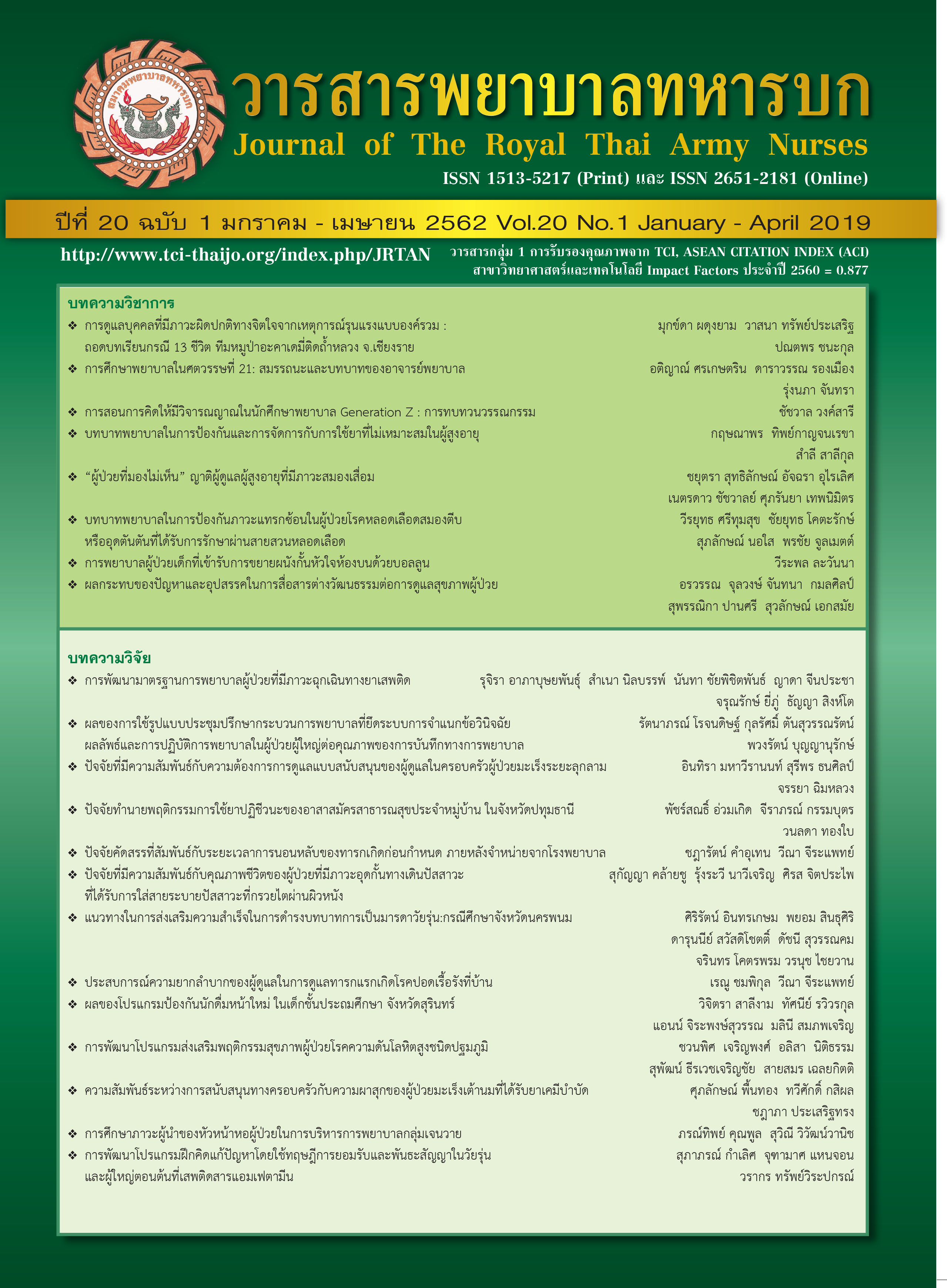Factors Related to Supportive Care Needs in Family Caregivers of Patients with Advanced Cancer
Keywords:
supportive care needs, caregivers patients with advanced cancerAbstract
The descriptive correlational research examined the supportive care needs and the relationship between selected factors related to supportive care needs in family caregivers of patients with advanced cancer. One hundred and eighty four participants was family caregivers of patients with advanced cancer were recruited by purposive sampling. Participants were family caregivers of the patients followed up at out-patient department of cancer clinics form 3 tertiary hospitals in Bangkok. The research instruments included the demographic data form and The State Anxiety Inventory form Y, The Social support assessment form, The Fatigue scale, The Edmonton Symptom Assessment Scale, The supportive care needs survey for partners and caregivers, The Knowledge assessment form and The Karnofsky Performance Status. Data were analyzed using mean, standard deviations and Pearson’s product moment Correlation. The research results were as follow: 1) The supportive care needs in family caregivers of cancer patients was at moderate level (mean = 3.09, SD = 0.74). 2) Social support and physical performance of patients were negatively and significantly related to supportive care needs in family caregivers of cancer patients (r = -.21 and -.22, p <.05 respectively) 3) Knowledge, anxiety, fatigue and symptoms severity were positively and significantly related to supportive care needs in family caregivers of cancer patients (r = .17, .20, .29 and .37, p <.05 respectively). However, age was not significantly related to supportive care needs in family caregivers of cancer patients (r = .06, p >.05)
Downloads
References
Sotiluk U, Wisesrith W. Effects of case management combined with palliative care model in patients with metastatic cancer on length of stay and quality of nursing care. Journal of The Royal Thai Army Nurese. 2017; 18 (suppl): 68-75. (in Thai)
Bee PE, Barnes P, Luker KA. A systematic review of informal caregivers’ needs in providing home-based end-of-life care to people with cancer. Journal of Clinical Nursing 2009;18(10):1379-93.
Chen SC, Lai YH, Liao CT, Huang BS, Lin CY, Fan KH, et al. Unmet supportive care needs and characteristics of family caregivers of patients with oral cancer after surgery. Psychooncology 2014;23(5):569-77.
Ewing G, Brundle C, Payne S, Grande G. The Carer Support Needs Assessment Tool (CSNAT) for use in palliative and end-of-life care at home: a validation study. J Pain Symptom Manage 2013;46(3):395-405.
Kim Y, Given BA. Quality of life of family caregivers of cancer survivors: across the trajectory of the illness. Cancer. 2008;112(11 Suppl):2556-68.
Sanson-Fisher R, Girgis A, Boyes A, Bonevski B, Burton L, Cook P. The unmet supportive care needs of patients with cancer. Supportive Care Review Group. Cancer. 2000; 88(1):226-37.
Girgis A, Lambert SD, McElduff P, Bonevski B, Lecathelinais C, Boyes A, et al. Some things change, some things stay the same: a longitudinal analysis of cancer caregivers’ unmet supportive care needs. Psychooncology 2013;22(7):1557-64.
Wannasiri S, A study of needs of family caregivers of cancer patients and related factors. [Dissertation]. Bangkok: Chulalongkorn University; 2005. (in Thai)
Shaw J, Harrison J, Young J, Butow P, Sandroussi C, Martin D, et al. Coping with newly diagnosed upper gastrointestinal cancer: a longitudinal qualitative study of family caregivers’ role perception and supportive care needs. Support Care Cancer 2013;21(3):749-56.
Sklenarova H, Krumpelmann A, Haun MW, Friederich HC, Huber J, Thomas M, et al. When do we need to care about the caregiver? Supportive care needs, anxiety, and depression among informal caregivers of patients with cancer and cancer survivors. Cancer 2015;121(9):1513-9.
Boonbarwornrattanakul A, Anxiety Need and receipt of need’s response of critically ill families. [Dissertation]. Bangkok: Mahidol University; 1995 (in Thai)
Pomrod T, Monkong S, Sirapo-ngam Y. Responses to Needs and Coping to Stress of Patients’ Relatives. Ramathibodi Nursing Journal. 2011; 17(1):75-89. (in Thai)
Makmai S, Sirichayanugul C, Sirichayanugul T. Common symptoms and needs of pre-discharge advanced-stage cancer patient: A case-study at Phrae Hospital, Thailand. Thai Cancer Journal 2013; 33(4):132-45. (in Thai)
Suwisith N, Hanucharurnkul S, Dodd M, Vorapongsathorn T, Pongthavorakamol K, Asavametha N. Symptom clusters and functional status of women with breast cancer. Pacific Rim International Journal of Nursing Research 2008;12(3):153-65. (in Thai)
Petpichedchain W, Bestnursing practice in cancer care. Songkhla: Chanmueang printing. 2011. (in Thai)
Goris S, Klc Z, Elmal F, Tutar N, Takc O. Care Burden and Social Support Levels of Caregivers of Patients with Chronic Obstructive Pulmonary Disease. Holist Nurs Pract 2016; 30(4):227-35.
Hodgkinson K, Butow P, Hunt GE, Wyse R, Hobbs KM, Wain G. Life after cancer: couples’ and partners’ psychological adjustment and supportive care needs. Supportive Care in Cancer 2007;15(4):405-15.
Downloads
Published
How to Cite
Issue
Section
License
บทความหรือข้อคิดเห็นใดใดที่ปรากฏในวารสารพยาบาลทหารบกเป็นวรรณกรรมของผู้เขียน ซึ่งบรรณาธิการหรือสมาคมพยาบาลทหารบก ไม่จำเป็นต้องเห็นด้วย
บทความที่ได้รับการตีพิมพ์เป็นลิขสิทธิ์ของวารสารพยาบาลทหารบก
The ideas and opinions expressed in the Journal of The Royal Thai Army Nurses are those of the authors and not necessarily those
of the editor or Royal Thai Army Nurses Association.






